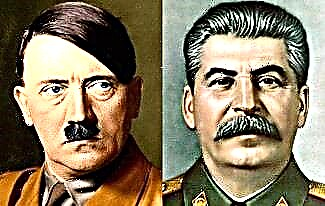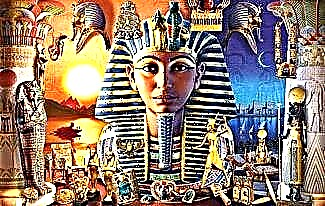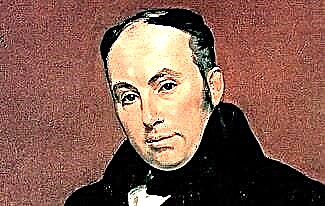Nero (birth name Lucius Domitius Ahenobarbus; 37-68) - Roman emperor, the last of the Julian-Claudian dynasty. Also princeps of the Senate, tribune, father of the fatherland, great pontiff and 5-time consul (55, 57, 58, 60 and 68).
In Christian tradition, Nero is considered the first state organizer of the persecution of Christians and the execution of the apostles Peter and Paul.

Secular historical sources report the persecution of Christians during the reign of Nero. Tacitus wrote that after the fire of 64 years, the emperor staged mass executions in Rome.
There are many interesting facts in the biography of Nero, which we will talk about in this article.
So, here is a short biography of Nero.
Biography of Nero
Nero was born on December 15, 37 in the Italian commune of Ancius. He belonged to the ancient Domitian family. His father, Gnaeus Domitius Ahenobarbus, was a patrician politician. Mother, Agrippina the Younger, was the sister of the emperor Caligula.
Childhood and youth
Nero lost his father in early childhood, after which his aunt took up his upbringing. At that time, his mother was in exile for being involved in a conspiracy against the emperor.
When in 41 AD Caligula was killed by the rebellious Praetorians, Claudius, who was Nero's uncle, became the new ruler. He ordered the release of Agrippina, not forgetting to confiscate all of her property.
Soon, Nero's mother married Guy Slusaria. At that time, the biography of the boy studied various sciences, and also studied dancing and musical art. When Slyusarius died in 46, rumors began to spread among the people that he had been poisoned by his wife.
3 years later, after a series of palace intrigues, the woman became the wife of Claudius, and Nero became the stepson and possible emperor. Agrippina dreamed that her son would sit on the throne, but her plans were hampered by Claudius's son from a previous marriage - Britannicus.
Possessing great influence, the woman entered into a fierce struggle for power. She managed to excommunicate Britannica and bring Nero closer to the imperial chair. Later, when Claudius became aware of everything that was happening, he decided to return his son to the court, but did not have time. Agrippina poisoned him with mushrooms, presenting the death of her husband as a natural death.
Governing body
Immediately after Claudius died, 16-year-old Nero was proclaimed the new emperor. At the time of his biography, his teacher was the Stoic philosopher Seneca, who gave the newly elected ruler a lot of practical knowledge.
In addition to Seneca, the Roman military leader Sextus Burr was involved in the upbringing of Nero. Thanks to the influence of these men in the Roman Empire, many useful bills were developed.
Initially, Nero was under the full influence of his mother, but after a few years he opposed her. It is worth noting that Agrippina fell out of favor with her son on the advice of Seneca and Burr, who did not like the fact that she interfered in the political affairs of the state.
As a result, the offended woman began to conduct intrigues against her son, intending to declare Britannicus as the legal ruler. When Nero learned about this, he ordered the poisoning of Britannicus, and then expelled his mother from the palace and deprived her of all honors.

By that time in his biography, Nero had become a narcissistic tyrant, who was more interested in personal affairs than in the problems of the empire. Most of all, he wanted to gain fame as an actor, artist and musician, while not possessing any talents.
Wanting to gain complete independence from anyone, Nero decided to kill his own mother. He tried to poison her three times, and also arranged for the collapse of the roof of the room where she was and organized the shipwreck. However, each time the woman managed to survive.
As a result, the emperor simply sent soldiers to her house to kill her. The death of Agrippina was presented as payment for the assassination attempt on Nero.
The son personally burned the body of the deceased mother, allowing the slaves to bury her ashes in a small tomb. An interesting fact is that later Nero admitted that the image of his mother haunts him at night. He even called sorcerers to help him get rid of her ghost.

Feeling absolute freedom, Nero indulged in revelry. He often organized feasts, which were accompanied by orgies, chariot races, celebrations and all kinds of competitions.
Nevertheless, the ruler was also involved in state affairs. He earned the respect of the people after he developed many laws regarding the reduction of the size of deposits, fines and bribes to lawyers. In addition, he ordered the abolition of the decree regarding the re-capture of freedmen.
To fight corruption, Nero ordered that the posts of tax collectors be entrusted to middle-class people. Interestingly, under his rule, taxes in the state were reduced by almost 2 times! In addition, he built schools, theaters and arranged gladiatorial fights for the people.
According to a number of Roman historians in those years of biography, Nero showed himself to be a talented administrator and a far-sighted ruler, in contrast to the second half of his reign. Almost all of his actions were aimed at making life easier for ordinary people and strengthening his power thanks to his popularity among the Romans.
However, in the last few years of his reign, Nero turned into a real tyrant. He got rid of prominent figures including Seneca and Burra. The man killed hundreds of ordinary citizens who, in his opinion, undermined the authority of the emperor.
Then the despot launched a campaign against Christians, persecuting them in every possible way and subjecting them to cruel reprisals. At that time in his biography, he imagined himself to be a genius poet and musician, presenting his work to the public.
None of his entourage dared to tell Nero in person that he was a completely mediocre poet and musician. Instead, everyone tried to flatter him and praise his works. Moreover, hundreds of people were hired to applaud the ruler during his speeches for a fee.
Nero became even more mired in orgies and luxurious feasts that drained the state treasury. This led to the fact that the tyrant ordered to kill the rich, and confiscate all their property in favor of Rome.

The terrible fire that engulfed the empire in the summer of 64 was one of the largest natural disasters. In Rome, rumors spread that this was the work of the "crazy" Nero. Those close to the emperor no longer doubted that he was mentally ill.
There is a version that the man himself ordered to set fire to Rome, thus wanting to get inspiration for writing a "masterpiece" poem. However, this assumption is disputed by many biographers of Nero. According to Tacitus, the ruler gathered special troops to extinguish the fire and help the citizens.
The fire raged for 5 days. After its completion, it turned out that only 4 of the city's 14 districts survived. As a result, Nero opened his palaces for the disadvantaged people, and also supplied the poor citizens with food.
In memory of the fire, the man began construction of the "Golden Palace of Nero", which remained unfinished.
Obviously, Nero had nothing to do with the fire, but it was necessary to find the culprits - they were Christians. The followers of Christ were accused of burning Rome, as a result of which large-scale executions began, which were arranged in a spectacular and varied manner.
Personal life
Nero's first wife was a daughter of Claudius named Octavia. After that, he entered into a relationship with the former slave Acta, which greatly outraged Agrippina.
When the emperor was about 21 years old, he was carried away by one of the most beautiful girls of that time, Poppea Sabina. Later, Nero broke up with Octavia and married Poppaea. An interesting fact is that in the near future Sabina will order to kill the previous wife of her husband, who was in exile.

Soon the couple had a girl, Claudia Augusta, who died after 4 months. After 2 years, Poppaea became pregnant again, but as a result of a family quarrel, a drunken Nero kicked his wife in the stomach, which led to a miscarriage and death of the girl.
The tyrant's third wife was his former lover Statilia Messalina. A married lady lost her husband by order of Nero, who forced him to commit suicide.
According to some documents, Nero had same-sex relationships, which was quite normal for that time. He was the first to celebrate weddings with his chosen ones.
For example, he married the eunuch Spore and then dressed him up as an empress. Suetonius writes that "he gave his own body so many times to debauchery that hardly at least one of his members remained undefiled."
Death
In 67, the generals of the provincial armies led by Gallius Julius Vindex organized a conspiracy against Nero. The Italian governors also joined the opponents of the emperor.
This led to the fact that the Senate declared the tyrant a traitor to the Motherland, as a result of which he had to flee the empire. For a while, Nero hid in the house of a slave. When the conspirators found out where he was hiding, they went to kill him.
Realizing the inevitability of his death, Nero, with the help of his secretary, cut his throat. The last phrase of the despot was: "Here it is - loyalty."
Photos of Nero


















